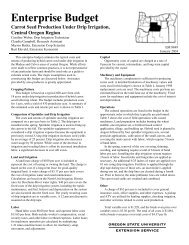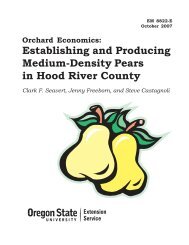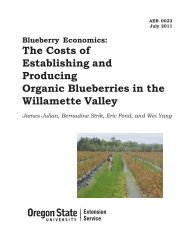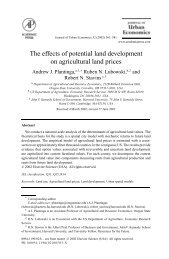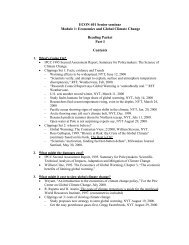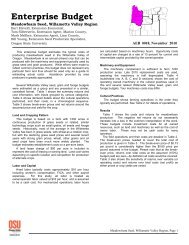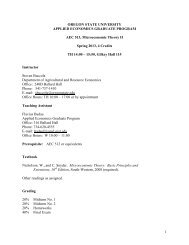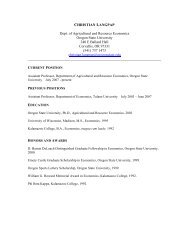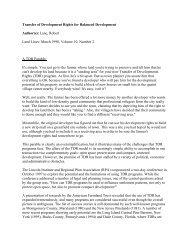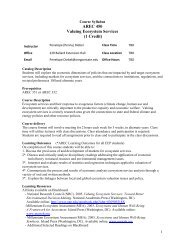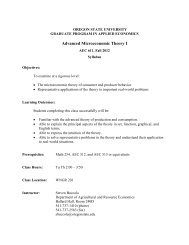Handing over the family business
Handing over the family business
Handing over the family business
Create successful ePaper yourself
Turn your PDF publications into a flip-book with our unique Google optimized e-Paper software.
DON ANSLOW<br />
<strong>Handing</strong> <strong>over</strong> <strong>the</strong><br />
<strong>family</strong> <strong>business</strong><br />
Austin Van Meter is only 13 years old, but his fa<strong>the</strong>r, Ron,<br />
already has a succession plan in place to ensure a smooth<br />
transition of <strong>the</strong> <strong>family</strong> <strong>business</strong>, even if Austin opts for a<br />
different career.<br />
Plan ahead To Transfer WealTh and haPPiness<br />
By Don Anslow<br />
ith <strong>the</strong> passage of a $7.5 million exemption from<br />
<strong>the</strong> state’s 9 percent estate taxes on agricultural<br />
property this Legislative Session, Oregon nursery<br />
owners were recently given a strong incentive to<br />
keep <strong>the</strong> “<strong>family</strong>” in <strong>family</strong>-owned <strong>business</strong>es. The exemption<br />
applies only if <strong>the</strong> property is passed to a <strong>family</strong> member and<br />
remains in agricultural production for five of <strong>the</strong> next eight years.<br />
Jeff Stone, <strong>the</strong> OAN’s director of g<strong>over</strong>nment relations, explains<br />
<strong>the</strong> importance of pursuing this legislation. “The enthusiastic support<br />
we received from Republicans and Democrats alike speaks<br />
to <strong>the</strong> importance legislators placed on passing on <strong>the</strong> nursery or<br />
farm from one generation to <strong>the</strong> next. Estate tax reform was a priority<br />
for <strong>the</strong> nursery industry, and I am pleased that <strong>the</strong> association<br />
was able to deliver a significant victory to our members.”<br />
Now, more than ever, succession of nursery ownership to <strong>the</strong><br />
<strong>family</strong> remains an attractive option, but it is not without its pitfalls.<br />
Like any <strong>business</strong> transaction, <strong>the</strong> transfer of assets (or operations)<br />
between generations is best handled with a plan and a strategy.<br />
The owner contemplating retiring after an orderly transfer of <strong>the</strong><br />
<strong>business</strong> to his <strong>family</strong> with tax protection under this new law must,<br />
at <strong>the</strong> very least, prepare his <strong>family</strong> for a minimum of five years of<br />
operations. An owner choosing to gift his assets to his <strong>family</strong> faces<br />
a lengthy process constrained by federal limitations, and an owner<br />
choosing to “take <strong>the</strong> money and run” faces huge tax burdens<br />
38<br />
▲<br />
SEPTEMBER 2007 ▲ DIGGER 37<br />
DON ANSLOW
KEVIN CURRY<br />
BUSINESS SUCCESSION<br />
Ron Van Meter’s college education was<br />
interrupted to take <strong>over</strong> <strong>the</strong> <strong>business</strong> his<br />
fa<strong>the</strong>r started, and he wants to give his son<br />
a chance to pursue his dreams beyond <strong>the</strong><br />
nursery before deciding whe<strong>the</strong>r he will<br />
accept <strong>the</strong> responsibility.<br />
and uncertain real estate selling cycles<br />
— not to mention <strong>the</strong> emotional and<br />
financial impact upon his successors.<br />
The formulation of a successful<br />
plan — sooner, not later — is vital to<br />
preserving <strong>family</strong> assets. But as Ron Van<br />
Meter of Van Meter & Son Nursery in<br />
Boring, Ore., disc<strong>over</strong>ed, <strong>family</strong> assets<br />
include far more than financial capital.<br />
Ron is an active participant in an ongoing<br />
succession plan. The emotional<br />
health and happiness of all parties are<br />
a vital consideration in such plans. He<br />
should know; he has seen succession<br />
from both sides.<br />
Ron’s fa<strong>the</strong>r, Morris, started <strong>the</strong><br />
nursery <strong>over</strong> 35 years ago in <strong>the</strong> <strong>family</strong>’s<br />
backyard. It grew <strong>over</strong> <strong>the</strong> years<br />
to become a 550-acre, highly efficient<br />
<strong>business</strong> — very different from its<br />
humble beginnings. In 2004, Morris<br />
and his son started to discuss how<br />
Morris would retire, and <strong>the</strong>n in 2005<br />
he did. One year was insufficient time<br />
to execute <strong>the</strong> transfer of <strong>the</strong> <strong>business</strong><br />
without unnecessary hardships, not <strong>the</strong><br />
least of which was giving up school.<br />
Ron explains: “One of my biggest<br />
regrets is only being able to complete<br />
two years of college because I came<br />
38 SEPTEMBER 2007 ▲ DIGGER<br />
back to work in <strong>the</strong> <strong>family</strong> <strong>business</strong><br />
and could never go back. I would have<br />
been a better partner to my fa<strong>the</strong>r and<br />
our associates if a process had been<br />
in place for <strong>the</strong> transition between my<br />
fa<strong>the</strong>r and myself.”<br />
With insight gained from that trying<br />
experience, Ron sums up <strong>the</strong> bottom<br />
line for a good plan. “One goal is that<br />
you maintain your friendship during<br />
<strong>the</strong> process,” he says. Clearly, Ron<br />
understands that succession is a twoway<br />
street. “It is my responsibility to<br />
see that [<strong>the</strong> next] succession is done<br />
in such a manner that <strong>the</strong> long-term<br />
ramifications are beneficial to <strong>the</strong> one<br />
transferring and <strong>the</strong> one receiving,” he<br />
adds.<br />
During a recent tour of Van Meter<br />
Nursery, a visitor mused that while<br />
Ron’s 13-year-old son, Austin, worked<br />
hard at trimming an endless line of<br />
grafted conifers, <strong>the</strong> foresight of Ron’s<br />
plan was striking. Yet Ron has already<br />
implemented a succession plan with<br />
<strong>the</strong> assistance of Doug Sippel, president<br />
of Titan Financial Associates.<br />
True wealth planning<br />
Sippel approaches <strong>the</strong> process by<br />
first helping clients and <strong>the</strong>ir families<br />
understand <strong>the</strong> value of <strong>the</strong>ir assets.<br />
Sippel notes that when asked to define<br />
<strong>the</strong>ir assets, most people’s answers<br />
usually include <strong>the</strong> expected: Business,<br />
real estate, stocks, cash, etc. But when<br />
he poses a simple question: “What is<br />
your most important asset?” <strong>the</strong> answers<br />
are far different.<br />
“If you have never asked yourself<br />
this question, you should,” he says.<br />
Sippel reports that people’s answers<br />
usually come down to: “my health,<br />
my <strong>family</strong> and my integrity.” He points<br />
out that <strong>the</strong>re are four types of capital<br />
which make up what he coins “True<br />
Wealth”:<br />
• Financial Capital — Monetary<br />
assets with a dollar value.<br />
• Human Capital — Includes values<br />
and virtues that prepare heirs to<br />
manage <strong>business</strong> with character, ethics,<br />
morality and integrity.<br />
• Intellectual Capital —<br />
Knowledge, training and experience.<br />
• Social Capital — Things you<br />
cannot keep: charitable gifts or taxes.<br />
Sippel’s True Wealth concept does<br />
not <strong>over</strong>look <strong>the</strong> obvious financial<br />
requirements addressed in traditional
estate planning, but additionally provides<br />
“tools” for <strong>the</strong> optimum transfer<br />
of wealth, particularly <strong>the</strong> o<strong>the</strong>r three<br />
less tangible capitals. The most significant<br />
tool is <strong>the</strong> drafting of a Family<br />
Financial Philosophy. This document<br />
defines financial independence and<br />
your <strong>family</strong>’s capital legacy according<br />
to your expressed values; it g<strong>over</strong>ns<br />
<strong>the</strong> planning and implementation processes<br />
and provides a road map for<br />
your successors like no o<strong>the</strong>r document<br />
— including a will — can. O<strong>the</strong>r<br />
tools include:<br />
• Developing a <strong>family</strong> communications<br />
system.<br />
• Teaching young heirs <strong>the</strong> values<br />
and responsibilities associated with<br />
financial wealth, and creating mentorlike<br />
relationships in trusts or LLCs.<br />
• Transferring authority and responsibility<br />
to young heirs as appropriate.<br />
Family involvement:<br />
communicate your wishes<br />
Sometimes, without meaning to,<br />
parents can allow <strong>the</strong> succession planning<br />
process to become something<br />
<strong>the</strong>y do to <strong>the</strong>ir children ra<strong>the</strong>r than<br />
with <strong>the</strong>m.<br />
“When appropriate,” Sippel explains,<br />
“<strong>the</strong> children — even <strong>the</strong> grandchildren<br />
— should be included in <strong>the</strong> process.<br />
Think of your job as a manager ra<strong>the</strong>r<br />
than an owner. Good managers do<br />
not consider <strong>the</strong> assets as <strong>the</strong>ir own,<br />
but (know <strong>the</strong>y are) charged with <strong>the</strong><br />
responsibility to be good stewards of<br />
<strong>the</strong> assets under <strong>the</strong>ir control. Part of<br />
that job is building a good warehouse<br />
to hold those assets. This warehouse is<br />
<strong>the</strong> people who will be given <strong>the</strong> job of<br />
managing <strong>the</strong> assets after you turn <strong>the</strong><br />
job <strong>over</strong> to <strong>the</strong>m. So focus on preparing<br />
your heirs with <strong>the</strong> character, integ-<br />
BUSINESS SUCCESSION<br />
rity, self-confidence and ethics to be<br />
excellent stewards in <strong>the</strong>ir own right.”<br />
In <strong>the</strong> case of <strong>business</strong> exit planning,<br />
where time constraints for tax,<br />
training and o<strong>the</strong>r considerations are<br />
paramount to <strong>the</strong> success of <strong>the</strong> <strong>business</strong><br />
under <strong>the</strong> young successor’s leadership,<br />
Sippel points out that all too<br />
often time runs out — or at least runs<br />
too short. “There are cases when <strong>the</strong><br />
parent waits too long to communicate<br />
<strong>the</strong>ir real desires, and children get sent<br />
<strong>the</strong> message that mom or dad is going<br />
to be in charge until <strong>the</strong>y die. Even if<br />
this is not <strong>the</strong> intent, it is communicated<br />
through actions.”<br />
In his experience Sippel has<br />
observed that such miscommunication<br />
can lead to successors (or key employees)<br />
being ill-prepared to assume<br />
effective leadership of a <strong>family</strong> busi-<br />
40<br />
▲<br />
SEPTEMBER 2007 ▲ DIGGER 39
40 SEPTEMBER 2007 ▲ DIGGER<br />
BUSINESS SUCCESSION<br />
ness. O<strong>the</strong>r common issues are <strong>the</strong><br />
unneeded diversion of a young person<br />
from a different — and possibly more<br />
appropriate — career because <strong>the</strong>y feel<br />
unsupported in pursuing it. Or, as with<br />
Ron and his fa<strong>the</strong>r, a young person can<br />
be interrupted in <strong>the</strong> middle of an education.<br />
In any case, poor communication,<br />
<strong>the</strong> lack of a plan and <strong>the</strong> absence<br />
of a philosophy make continuity of<br />
good stewardship a needless struggle.<br />
At Van Meter & Son Nursery, Ron<br />
operates his <strong>business</strong> with a keen sense<br />
of such stewardship and with <strong>the</strong> values<br />
and discipline to achieve success on a<br />
variety of levels. Business, including<br />
monitoring of succession parameters,<br />
is g<strong>over</strong>ned through a strategic plan<br />
with 1-, 5- and 10-year goals, which are<br />
monitored monthly.<br />
On a bright summer morning, a<br />
recent visitor noted not only young<br />
Austin Van Meter’s diligent labors, but<br />
also <strong>the</strong> well-used motocross motorcycle<br />
standing proudly in <strong>the</strong> back of<br />
his fa<strong>the</strong>r’s truck — Austin’s cycle as it<br />
turns out. Clearly <strong>the</strong> young Van Meter<br />
has interests beyond plants. In fact, he<br />
is an avid, and rapidly advancing, junior<br />
motocross rider. Could his life’s passions<br />
stray from receiving a <strong>business</strong> that his<br />
fa<strong>the</strong>r so carefully tends? It may not<br />
look that way on a day when fa<strong>the</strong>r and<br />
son are engaged in a thriving <strong>business</strong><br />
that brings <strong>the</strong>m toge<strong>the</strong>r in a healthy<br />
enterprise that serves <strong>the</strong>m both well on<br />
ledgers of financial and human capital.
However, Ron Van Meter acknowledges<br />
that it is a distinct possibility.<br />
The presence of such a plan gives<br />
Ron <strong>the</strong> confidence to face <strong>the</strong> future<br />
with his son’s happiness as <strong>the</strong> prime<br />
goal. “If I really love him, I must give<br />
him a chance to gain independence<br />
and a sense of self-worth separate<br />
from me or this <strong>business</strong>.” But whe<strong>the</strong>r<br />
Austin settles on a path to — or away<br />
from — <strong>the</strong> nursery, <strong>the</strong> Van Meter<br />
succession plan is designed to remain<br />
flexible enough to accommodate such<br />
eventualities without threatening his<br />
son’s aspirations or Ron’s retirement.<br />
Ron explains <strong>the</strong> rationale underpinning<br />
a sound plan. “If your objective<br />
is only to transfer money, <strong>the</strong>n it<br />
becomes very selfish,” he says.<br />
Drawing on <strong>the</strong> values of <strong>the</strong> True<br />
Wealth philosophy, he concludes, “It<br />
is my responsibility as a parent to gain<br />
BUSINESS SUCCESSION<br />
<strong>the</strong> experience and plan for all facets of<br />
<strong>the</strong> <strong>business</strong> transition. I want my son<br />
to be able to stay true to his dreams<br />
… and know that he is supported and<br />
loved in any decision that creates a<br />
healthy life for him.”<br />
Ultimately, no enterprise’s future<br />
is a sure thing. But with <strong>the</strong> help of<br />
Oregon’s more generous estate tax<br />
laws, an understanding of Sippel’s succession<br />
planning principles, and with<br />
a commitment — like that of Ron Van<br />
Meter — to an heir’s happiness, <strong>the</strong><br />
future for Oregon’s <strong>family</strong> owned nurseries<br />
looks bright.<br />
Don Anslow is a Portland area freelance<br />
writer. He can be reached at<br />
(503) 819-4460. Doug Sippel of Titan<br />
Financial Associates contributed heavily<br />
to this story. He can be reached at (503)<br />
629-0810 or dsippel@titanfa.com.<br />
<br />
<br />
<br />
<br />
<br />
<br />
<br />
<br />
<br />
<br />
<br />
<br />
<br />
<br />
<br />
<br />
<br />
<br />
<br />
<br />
<br />
<br />
<br />
<br />
<br />
<br />
SEPTEMBER 2007 ▲ DIGGER 41



